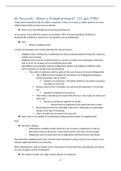M. Foucault, ‘What is Enlightenment?’ [12 pp] [TPR]
Today when a periodical asks its readers a question, it does so in order to collect opinions on some
subject about which everyone has an opinion
there is not much likelihood of learning anything new
In any event, in line with this custom, in November 1784 a German periodical, Berlinische
Monatschrift, published a response to the question was ist Aufklärung?
Kant
o What is enlightenment?
A minor text perhaps, but it merits attention for several reasons
- Enlightenment is defined by a modification of the pre-existing relation linking will, authority,
and the use of reason
- Enlightenment must be considered both as a process in which men participate collectively
and as an act of courage to be accomplished personally
- Kant defines two essential, spiritual, institutional, ethical, and political conditions under
which mankind can escape from its immaturity
o The realm of obedience and the realm of the use of reason be clearly distinguished
This is different from freedom of conscience as it distinguishes between
private and public uses of reason
Freedom of conscience = the right to think as one pleases so long as
one obeys as one must
Reason must be free in its public use and must be submissive in its private
use
opposite of freedom of conscience
Man makes a private use of reason when he has a role to play in society and
jobs to do
human as a particular segment of society
o Reason must be subjected to the particular ends in view
Reasoning must be free and public when one is reasoning as a reasonable
being for the sake of reasoning
How is a public use of reason to eb assured?
Kant’s text is not capable of constituting an adequate description of enlightenment
Kant
the three critiques
o Defining the conditions under which the use of reason is legitimate in order to
determine what can be known, what must be done, and what must be hoped
o Illegitimate uses of reason give rise to dogmatism and heteronomy and illusion
Kant describes enlightenment as the moment when humanity is going to put its own reason to use,
without subjecting itself to any authority
When viewing Kant’s text as located at the crossroads of critical reflection and reflection on history,
we may recognize a point of departure
the outline of what one might call the attitude of modernity
17





